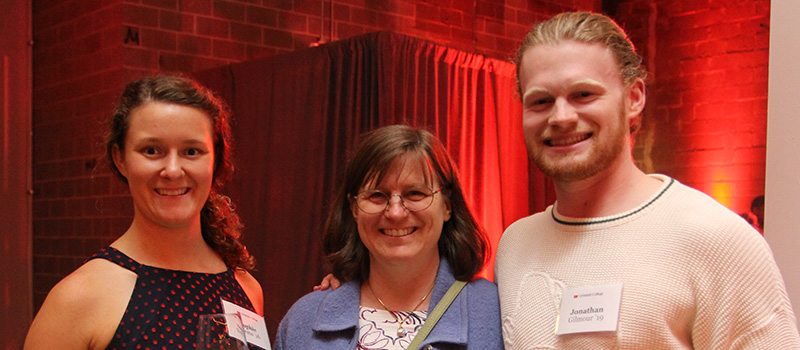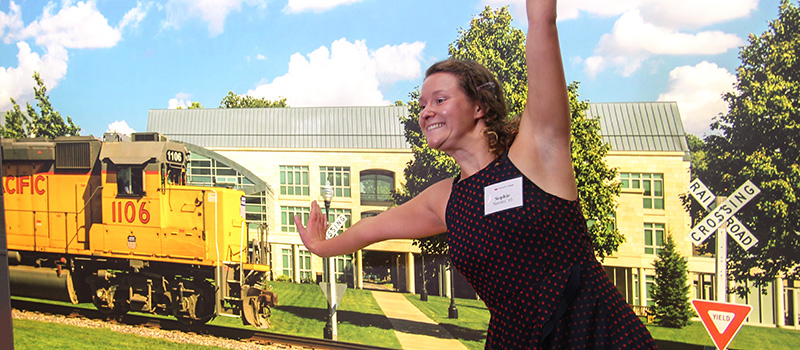Appetite for food justice will bring 2016 alumna to Spain on Fulbright grant
June 19, 2020 — In all honesty, Sophie Neems ’16 was skeptical about how well a virtual piano performance was going to work.
On May 14, Neems and fellow members of the Washington D.C. Regional Network Planning Committee hosted a virtual performance by musician Jon Richardson ’10.
“You never know if the technology is going to work and whether microphones will pick up things,” Neems says about her initial trepidation. “But it was awesome. Jon was fabulous. He was charming and funny, and he made everyone feel comfortable during the event. People were dancing in their living rooms and singing along with their microphones muted. The College does a really great job of making it easy for us to get engaged and participate.”
The same could be said about Neems. Throughout her time at Grinnell and in the four years following, she has helped build and strengthen community ties, with a special emphasis with issues related to food justice.
“When I got to Grinnell, the classes I took helped me to put my thoughts about food justice into words and context,” Neems says. “I learned about the food system and how complicated it is – all the people it impacts and the tension between environmental justice, social justice, and economic stability in the agriculture industry. The more I thought about food, the more I realized that food touches everything – environmental justice, racial justice, labor justice, immigration policy, joy, identity, home, connection to the land, the way we socialize, the way we show love, and the way we fuel our bodies to achieve our goals.”
Neems will continue her food justice journey next year overseas. She was recently selected for a Fulbright research grant in Cordoba, Spain, where she will study Spanish farmers’ perceptions of climate change and agriculture.
“I’m particularly interested in thinking about how farmers connect to place – how does their connection to land, home, and community influence the decisions that they make relative to adapting to climate change,” she says. “Are farmers that feel connected to their place more likely to recognize the threat of climate change and make land management decisions that ensure the health and longevity of their place?”
 Sophie Neems ’16, left, Christine Cozadd, and Jonathan Gilmour ’19 pose for a photo during a 2019 Campaign for Grinnell College event in Washington D.C.
Sophie Neems ’16, left, Christine Cozadd, and Jonathan Gilmour ’19 pose for a photo during a 2019 Campaign for Grinnell College event in Washington D.C.
Agriculture meets Spanish & anthropology
Neems grew up in Iowa City and recalls spending her summers at Country Camp, an imagination-based farm camp. In addition to normal youth camp activities, campers also did farm activities, such as feed the chickens and help with the garden. Right away, she loved being exposed to agricultural.
Sophie’s mom was a speech pathologist at the time and felt strongly that language skills were important. She enrolled Sophie in Spanish lessons at age four. Sophie continued taking Spanish all through high school, and “when I got to Grinnell it seemed sort of silly to stop taking it. The thought of having language skills other than English to use to communicate with even more people was really exciting to me and seemed like a practical skill to add to the other discipline I was studying.”
The other discipline turned out to be anthropology following a first-year tutorial taught by Anthropology Professor Jon Andelson ’70.
“I took a few more anthropology classes and it just felt like a good fit for me in terms of research methods,” Neems says. “I really love talking to people and learning about their experiences. Through participant observation, I get to experience a little bit of what someone else’s life is like.”
As a student, Neems ran cross country, interned with the Center for Careers, Life, and Service (CLS), was as a member of the Center for Prairie Studies Advisory Board, was a board member of the Local Foods Coop, the list goes on for a while.
“Each of those things was an effort to search out and contribute to a meaningful community,” she says. “I really enjoyed how the things that I would be learning in one area of my life would suddenly connect to something I was learning in a totally different area.”
 Neems playfully attempts to stop the Union Pacific train in front of a campus photo backdrop at the Washington D.C. campaign event.
Neems playfully attempts to stop the Union Pacific train in front of a campus photo backdrop at the Washington D.C. campaign event.
‘A great community to have’
After living in Iowa her whole life, Neems was intentional about moving out of state after graduation in 2016. She worked for a year with Brainfood, a youth development nonprofit that used cooking as a tool for teaching life skills to high school age students in the D.C. area. She then interned with the National Farmers Union before starting her current job as a communications specialist with the Farm Credit Council.
Farm Credit is a network of cooperatively owned agricultural lending institutions across the country that support farmers and rural communities. The Farm Credit Council is the national trade association that represents the Farm Credit System before Congress. Neems writes articles for the council’s website and blog. Prior to the pandemic, she attended events to represent Farm Credit and enjoyed getting to learn about other types of agriculture and what other people in the space are doing.
“Working a job in D.C. is like being in a civics class all the time,” she says. “I’m learning how the government works, how decision-making processes happen, and also the behind-the-scenes stuff that you don’t get to see if you’re not in Washington.”
Her first summer in D.C., Neems attend a Grinnell College summer picnic. One of the alums kindly (but strongly) encouraged her and other young alumni to get involved in the regional network. Now in 29 cities, regional networks strive to promote the College’s spirit, mission, and vision, as well as build camaraderie among alumni, students, parents, and friends.
Shortly thereafter, Neems and three other alums started organizing happy hours every other month for D.C. alums. In 2018, Neems and Emma Lange ’16 put on a Zoo Lights event for Grinnellians at the Smithsonian National Zoo.
“I think it’s a great community to have,” Neems says. “I like being able to see familiar faces, because I feel like there’s a core group of folks that come to most of our events but there are new folks to meet as well.”
With the success of the virtual piano night, the planning committee is thinking about several other virtual events to keep alumni engaged this summer and fall. One idea, for instance, is a virtual tour of the Grinnell Museum of Art.
“While most people would prefer in-person event, doing virtual events really opens up the type of events that we can do.” Neems says. “Grinnell alums are often doing really interesting things and have access to neat opportunities. Regional events are a great way to experience the city by way of other Grinnellians’ passions.”
—by Jeremy Shapiro